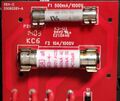Difference between revisions of "UNI-T UT804"
(Create initial page for UNI-T UT804.) |
m (Fix a small copy paste error, add power sources in description.) |
||
| Line 12: | Line 12: | ||
}} | }} | ||
The '''UNI-T UT804''' is a 40000/4000 counts, CAT III (1000V) / CAT IV (600V) | The '''UNI-T UT804''' is a 40000/4000 counts, CAT III (1000V) / CAT IV (600V) benchtop digital multimeter with RS232 and USB connectivity. It can be powered by AC power or by six 1.5V C battery cells. | ||
See [[UNI-T UT71x series]] for information common to all devices in this series. | See [[UNI-T UT71x series]] for information common to all devices in this series. | ||
Revision as of 00:12, 9 February 2020
 | |
| Status | in progress |
|---|---|
| Source code | serial-dmm |
| Counts | 40000/4000 |
| IEC 61010-1 | CAT III (1000V) / CAT IV (600V) |
| Connectivity | RS232 and USB (see also RS232 / USB) |
| Measurements | voltage, resistance, diode, continuity, capacitance, frequency, duty cycle, current, temperature |
| Features | autorange, hold, relative, min/max, bargraph, backlight, true-rms, data storage |
| Website | uni-trend.com |
The UNI-T UT804 is a 40000/4000 counts, CAT III (1000V) / CAT IV (600V) benchtop digital multimeter with RS232 and USB connectivity. It can be powered by AC power or by six 1.5V C battery cells.
See UNI-T UT71x series for information common to all devices in this series.
Hardware
Multimeter:
- 44000/440000-count dual-slope ADC: Cyrustek ES51966P (datasheet)
- 16-bit microcontroller: MSP430F149 datasheet
RS232 cable:
USB cable:
Disassembly
There are four screws on the bottom, one of them is captive and does not come out. The red (or grey in the newer revisions) plastic is held on two points top and bottom each. It can be taken off with the help of a flathead screwdriver and pops off easily.
Usage
To receive data from the UT804 via USB the driver and the USB VID/PID of the WCH CH9325 needs to be specified like this:
sigrok-cli -d uni-t-ut804:conn=1a86.e008 --continuous
Photos
RS232 interface:
USB interface:
Protocol
See UNI-T UT71x series#Protocol.




